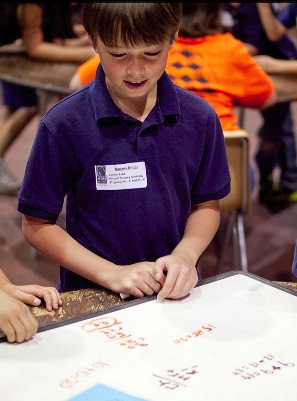In this article, I discuss brain plasticity -- the huge potential for our brains to grow -- and what it means for learning of math: EVERY student CAN learn math. Students need to have a growth mindset where they value mistakes and see them as opportunities for brain growth and learning.
Growth mindset and the value of mistakes in math learning
Our brain is a wondrous organ — and more so than perhaps any of us realize! It GROWS and CHANGES... by the minute!
I want you to hear about a young girl, Cameron, who had half of her brain removed. That's right — the doctors simply removed the right hemishpere of her brain in a surgery. The reason was a rare condition called Rasmussen's syndrome that caused violent seizures.
Cameron came out of surgery with the left side of her body paralyzed and immediately began intense therapy. She made an AMAZING recovery — she can now run and play and is a good student at school. The left side of her brain took over for the right side in an extraordinary manner. She only has a slight limp and has lost some peripheral vision. No other lingering effects from the surgery! (Read an update from 2015 on Cameron here)
It is called brain plasticity — the ability of the brain to change, grow, and rewire itself to meet new challenges.
And, our brains have a huge potential for that.
Watch the video below by Jo Boaler, where she explains a study done on London taxi drivers. They have to learn a huge amount of information before they are allowed to drive a Black Cab: 320 routes that help them remember and learn the 25,000 streets and 20,000 landmarks and places of interest. They have to take a test called "The Knowledge." It takes between two and four years to pass it.
A study done on their brains found that the area in their brain called hippocampus had grown substantially bigger than in normal people. And, when they stopped working, the hippocampus shrunk.
EVERYONE can learn math
Yet, ironically, people often think that some of our children and students cannot grow a few new synapses to learn math. This is a completely FALSE concept. Practically ALL of our children have the capabilities of learning ALL of K-12 math if they have a normal human brain (and do not suffer from severe learning disabilities).
Instead, one of the main problems is the kinds of experiences these children have had in the past... HOW they have been taught to do math, the kind of PRAISE they have been given, and the resulting mindset they have developed:
- a fixed mindset versus
- a growth mindset
A fixed mindset is a mindset that believes intelligence (the brain) is fixed and not changing. But, it is a mindset that HINDERS brain growth AND the growth of one's intelligence. A person with a fixed mindset avoids challenges.
A person with growth mindset, on the other hand, sees difficult tasks as OPPORTUNITIES for growth. They believe that with effort, they CAN learn. And, as they struggle to learn and grasp the problem, their brain ACTUALLY grows new connections between neurons (synapses).
Obviously, that is what we want to strive for in our children... and in us!
How can we encourage a growth mindset in students?
The main way is to help students value MISTAKES. They — and we — need to see MISTAKES as something very valuable for math learning.
Here are some ideas:
- Simply: encourage mistakes at all times. Do not put them down. Show your children/students that YOU value them. You can even "praise" mistakes in this sense: tell the student, "Great, I'm glad for this mistake, because it helps your brain to grow!"
Quoting Jo Boaler,When I have tutored people in math, I've always started by saying, "By the way, I just want you to know that I love mistakes the most. They are the time that your brain grows, when you really learn, so it's really great to make mistakes." Mistakes, and people immediately relax and breathe a sigh of relief and are much more willing to jump in to problems and persist longer.
- Explain to students or your children WHY mistakes are important. Tell them about the brain growth!
- USE student mistakes in your teaching. If you can get where students are comfortable with sharing them with you and with the whole class, if the mistake is dealt with in the right manner, not putting the person down, but emphasizing how VALUABLE it is, then everybody can learn from it.
- Do NOT use time-pressured tasks and tests. They give the impression that math is about finding quick answers to factual questions, and not about learning.
- Give students challenging work that encourages mistakes. The math problems need to be difficult enough so that students make mistakes, because if they can easily solve them, there is no brain growth. So try to always keep them at the "edge" of their understanding.
Often, you can even change a simple, "closed" math problem into an "open" one that encourages students to think. Check Jo's video below.
To find good word problems, see this list of problem solving websites and resources I've compiled — just start exploring!
Also, my books contain lots of word problems that encourage and challenge children to think.
You can find even more tips for promoting a growth mindset at this link.
By Maria Miller
Thank you for sharing all these great tips. I went ahead, after never buying curricula and rarely using anything structured, and bought the all-inclusive download (thanks for the co-op link!).
Here's the thing: my smart, behind-in-math kiddo is not a worksheet or worktext fan. Nor am I. We've been going over concepts, playing games, cooking, doing Mad Minutes and the like, without enough structure (and other ways of seeing things) for her to master math facts and develop confidence.
Looking into Math Mammoth, which I did slowly and cautiously, your program appears to have exactly what we've missed. I'm excited!
Blessings,
Chanel
Receive my monthly collection of math tips & resources directly in your inbox — and get a FREE Math Mammoth book!
You can unsubscribe at any time.
Math Mammoth TourConfused about the different options? Take a virtual email tour around Math Mammoth! You'll receive: An initial email to download your GIFT of over 400 free worksheets and sample pages from my books. Six other "TOURSTOP" emails that explain the important things and commonly asked questions concerning Math Mammoth curriculum. (Find out the differences between all these different-colored series!)This way, you'll have time to digest the information over one or two weeks, plus an opportunity to ask me personally about the curriculum. A monthly collection of math teaching tips & Math Mammoth updates (unsubscribe any time) We respect your email privacy.
Note: You will FIRST get an email that asks you to confirm your email address. If you cannot find this confirmation email, please check your SPAM/JUNK folder. |
"Mini" Math Teaching CourseThis is a little "virtual" 2-week course, where you will receive emails on important topics on teaching math, including:
- How to help a student who is behind You will also receive: A GIFT of over 400 free worksheets and sample pages from my books right in the very beginning.We respect your email privacy.
Note: You will FIRST get an email that asks you to confirm your email address. If you cannot find this confirmation email, please check your SPAM/JUNK folder. |
Maria's Math TipsEnter your email to receive math teaching tips, resources, Math Mammoth news & sales, humor, and more! I tend to send out these tips about once monthly, near the beginning of the month, but occasionally you may hear from me twice per month (and sometimes less often). Peek at the previous tips here. You will also receive:
We respect your email privacy.
|
|


